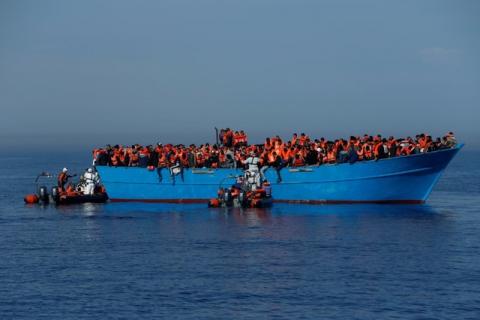Advertisement
Libya lacks plan to prevent more migrants crossing to Europe - EU officials
VALETTA (Reuters) - Libya's U.N-backed government has no clear plan to help prevent more migrants reaching Europe's shores this summer, European Union officials said on Thursday, citing confused requests for equipment to patrol its shores.
Libya's newly trained coastguards lack a strategy on where to deploy or how to detect and intercept smugglers, officials told Reuters, basing their analysis on two documents prepared for EU defense ministers meeting in Malta, the route to Italy on which thousands of people drowned last year.
The confidential EU assessment contrasts with the upbeat message the bloc has promoted after training 93 Libyan coastguards since late last year to tackle smugglers as the bloc scales back its plans to go into Libya's territorial waters.
The European Union says it cannot go into Libyan waters without a United Nations Security Council mandate, which the EU says Russia is unlikely to provide because of grievances over the West's 2011 air campaign that helped oust Muammar Gaddafi.
"Our objective is not to be in the territorial waters of Libya. Our objective is that in the territorial waters of Libya, the work is done by the Libyans," the European Union's top diplomat Federica Mogherini said, arriving to chair the meeting of defense ministers to discuss the EU strategy.
The European Union, which has five ships patrolling international waters near Libya, eventually aims to have 500 Libyans trained to catch people and arms traffickers off the shores of the North African country.
To help Libya, where the fragile government of Fayez al-Seraj has only a partial hold on the vast desert country, the European Union asked Tripoli to send its requests for equipment, in addition to the 10 patrol boats Italy is sending to the country.
Still divided between rival factions after the civil war that ended Gaddafi's rule, Libya's instability has thwarted EU efforts to repeat a contentious migration deal with Turkey to halt migrants moving to Germany via Greece.
"SHOPPING LIST"
In the Libyan request, which EU officials referred to as a "shopping list", the government failed to ask for any aircraft to help patrol Libyan shores, which one official said was odd.
Libyans wanted patrol boats with weapons but made no mention of the type of arms needed and provided only generic photographs of other equipment including outboard motors.
The officials said the equipment lists also made no sense without an operational plan of how to use EU military assets.
The European Union is concerned that equipment could fall into the hands of smugglers, although Antonello de Renzis Sonnino, a spokesman for the EU mission in the central Mediterranean said all Libyans chosen for training were vetted.
"So far, those newly trained members have returned for duty after rest periods, which is a sign of their commitment," he said on board the Italian ship that commands the mission.
NATO Secretary-General Jens Stoltenberg said in Malta his experts had met Libyan counterparts to discuss what kind of separate assistance the U.S.-led alliance could provide following a request for help in February.
Stoltenberg stressed the need to build a defense ministry, something EU officials hope would make Libya an easier partner.
"We have to understand the importance of institutions because that's the foundation for security," Stoltenberg said. "Of course it is important to train Libyans, but we have to make sure that when troops are trained, they are structured so you have them controlled and the troops are used in a good way."
(Writing by Robin Emmott; Editing by Hugh Lawson)



















Add new comment